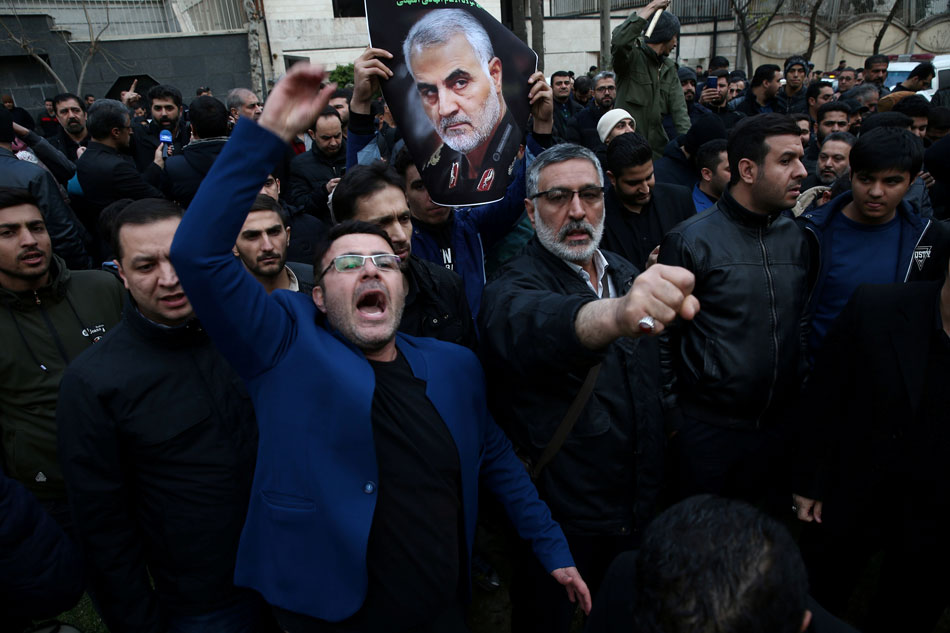US killing of Soleimani 'tantamount' to war, Iran's UN ambassador says | ABS-CBN

Welcome, Kapamilya! We use cookies to improve your browsing experience. Continuing to use this site means you agree to our use of cookies. Tell me more!
US killing of Soleimani 'tantamount' to war, Iran's UN ambassador says
US killing of Soleimani 'tantamount' to war, Iran's UN ambassador says
Michelle Nichols,
Reuters
Published Jan 04, 2020 01:49 PM PHT
UNITED NATIONS - The United States' killing of Iran's most prominent military commander, Qassem Soleimani, is virtual to starting a war and "the response for a military action is a military action," Iran's UN ambassador said on Friday.
UNITED NATIONS - The United States' killing of Iran's most prominent military commander, Qassem Soleimani, is virtual to starting a war and "the response for a military action is a military action," Iran's UN ambassador said on Friday.
Ambassador Majid Takht Ravanchi said in an interview with CNN that by "assassinating" Soleimani, the United States had entered a new stage after starting an "economic war" by imposing tough sanctions on Iran in 2018.
Ambassador Majid Takht Ravanchi said in an interview with CNN that by "assassinating" Soleimani, the United States had entered a new stage after starting an "economic war" by imposing tough sanctions on Iran in 2018.
"So that was ... a new chapter which is tantamount to opening a war against Iran," Ravanchi said.
"So that was ... a new chapter which is tantamount to opening a war against Iran," Ravanchi said.
Ravanchi, echoing Iranian leaders, said there would be harsh revenge. "The response for a military action is a military action," he said.
Ravanchi, echoing Iranian leaders, said there would be harsh revenge. "The response for a military action is a military action," he said.
ADVERTISEMENT
Earlier on Friday, the ambassador told the UN Security Council and Secretary-General Antonio Guterres that Iran reserves the right to self-defense under international law.
Earlier on Friday, the ambassador told the UN Security Council and Secretary-General Antonio Guterres that Iran reserves the right to self-defense under international law.
In a letter, Ravanchi said the killing of Soleimani "is an obvious example of State terrorism and, as a criminal act, constitutes a gross violation of the fundamental principles of international law, including, in particular... the Charter of the United Nations."
In a letter, Ravanchi said the killing of Soleimani "is an obvious example of State terrorism and, as a criminal act, constitutes a gross violation of the fundamental principles of international law, including, in particular... the Charter of the United Nations."
Soleimani, a 62-year-old general who headed the overseas arm of Iran's Revolutionary Guards, was regarded as the country's second most powerful figure after Supreme Leader Ayatollah Ali Khamenei.
Soleimani, a 62-year-old general who headed the overseas arm of Iran's Revolutionary Guards, was regarded as the country's second most powerful figure after Supreme Leader Ayatollah Ali Khamenei.
The United States killed Soleimani in an overnight attack in Iraq authorized by President Donald Trump. A senior Trump administration official said Soleimani had been planning imminent attacks on US personnel in the Middle East.
The United States killed Soleimani in an overnight attack in Iraq authorized by President Donald Trump. A senior Trump administration official said Soleimani had been planning imminent attacks on US personnel in the Middle East.
The United States could seek to justify killing Soleimani under Article 51 of the UN Charter, which covers an individual or collective right to self-defense against armed attack.
The United States could seek to justify killing Soleimani under Article 51 of the UN Charter, which covers an individual or collective right to self-defense against armed attack.
Under Article 51, countries are required to "immediately report" to the 15-member Security Council any measures taken in exercising the right to self-defense. The United States used Article 51 to justify taking action in Syria against Islamic State militants in 2014.
Under Article 51, countries are required to "immediately report" to the 15-member Security Council any measures taken in exercising the right to self-defense. The United States used Article 51 to justify taking action in Syria against Islamic State militants in 2014.
Diplomats said no such letter had yet been received from Washington on the killing of Soleimani.
Diplomats said no such letter had yet been received from Washington on the killing of Soleimani.
Guterres is deeply concerned by the recent rise in tensions in the Middle East, his spokesman Farhan Haq said in a statement earlier on Friday.
Guterres is deeply concerned by the recent rise in tensions in the Middle East, his spokesman Farhan Haq said in a statement earlier on Friday.
"This is a moment in which leaders must exercise maximum restraint. The world cannot afford another war in the Gulf," Haq said.
"This is a moment in which leaders must exercise maximum restraint. The world cannot afford another war in the Gulf," Haq said.
ADVERTISEMENT
ADVERTISEMENT


